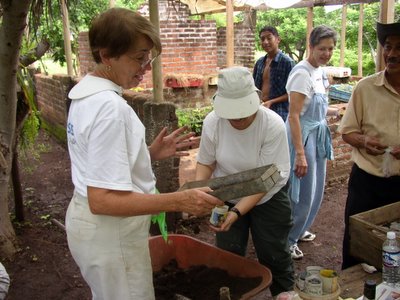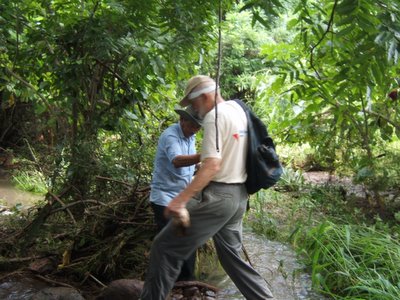Kay Ungurean Tells About Her Experiences in El Salvador

PHOTO: Kay Ungurean working in the greenhouse, El Maizal, August 2005
In 2004, I was one of five people from Iowa who went to El Salvador with Episcopal Relief and Development. In a village that was being built by and for 40 families, I helped clear the land for one of those houses. I cut tree limbs and weeds with a machete, hauled bricks, and dug rocks out of the ground.In 2005, my husband and I were part of a group of seven who went to El Salvador and worked at another site that would become a self-sufficient village with its own fruit and vegetable crops and livestock. We fertilized fruit trees, planted vegetable seeds, and partially cleared one house site.

PHOTO: Karl Ungurean crossing a creek in the orchard, El Maizal, August 2005
We always felt 100% safe. We were served three delicious meals daily and slept in air-conditioned rooms. We definitely were very well cared for and never felt that we were "roughing it."The cost for each person was $1,000, 7 days, and perspiration. We've been taught that "in giving you shall receive." That lesson really hits home on a mission trip. We received far, far more than we gave. There is now a family living in the house built where I cut branches and hauled rocks in 2004. The village is complete with 40 families in homes that have small Episcopal Church signs by the front doors. A doctor and social worker spend one day each week serving the village families. The school and church are being used.

PHOTO: Kay and Karl talking with two of our hosts, Mercedes and Blanca, San Salvador, August 2005
We received word a couple of months ago that two houses have been built at our 2005 work site. No doubt, there are more today.The greatest gift I've received in working side by side with El Salvadorans for 14 days is the relationship with them. In spite of having lived through civil wars, earthquakes, and poverty that is foreign to all of us, the people have given me love, care, laughter, tears, and generosity of spirit that are inspiring. My life is richer for having been privileged to be with them. Hopefully, my husband and I will return this year on another mission trip and be allowed the privilege of working with our friends again.
Going on a 7-day mission trip is truly a lifetime gift you receive. Thanks be to God.
—Kay Ungurean, Trinity Cathedral, Davenport, Iowa
To learn more about ERD's work in El Salvador and how you can get involved, go to http://www.er-d.org/programs_39576_ENG_HTM.htm or contact Ron and Toni Noah, Iowa's ERD Representatives, at harimau@thenoahs.net.



